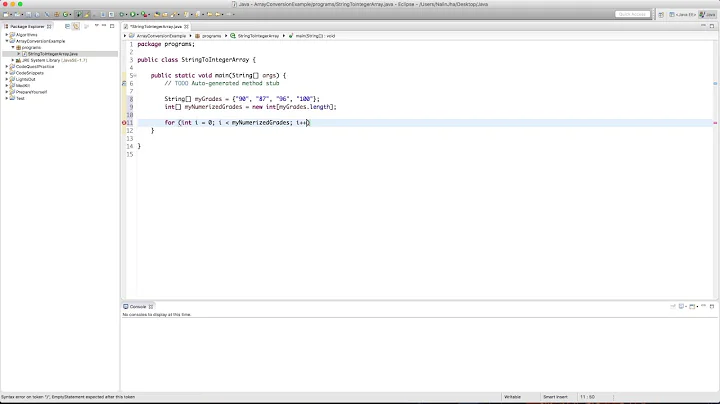Convert array values from string to int?
Solution 1
You can achieve this by following code,
$integerIDs = array_map('intval', explode(',', $string));
Solution 2
So I was curious about the performance of some of the methods mentioned in the answers for large number of integers.
Preparation
Just creating an array of 1 million random integers between 0 and 100. Than, I imploded them to get the string.
$integers = array();
for ($i = 0; $i < 1000000; $i++) {
$integers[] = rand(0, 100);
}
$long_string = implode(',', $integers);
Method 1
This is the one liner from Mark's answer:
$integerIDs = array_map('intval', explode(',', $long_string));
Method 2
This is the JSON approach:
$integerIDs = json_decode('[' . $long_string . ']', true);
Method 3
I came up with this one as modification of Mark's answer. This is still using explode() function, but instead of calling array_map() I'm using regular foreach loop to do the work to avoid the overhead array_map() might have. I am also parsing with (int) vs intval(), but I tried both, and there is not much difference in terms of performance.
$result_array = array();
$strings_array = explode(',', $long_string);
foreach ($strings_array as $each_number) {
$result_array[] = (int) $each_number;
}
Results
Method 1 Method 2 Method 3
0.4804770947 0.3608930111 0.3387751579
0.4748001099 0.363986969 0.3762528896
0.4625790119 0.3645150661 0.3335959911
0.5065748692 0.3570590019 0.3365750313
0.4803431034 0.4135499001 0.3330330849
0.4510772228 0.4421861172 0.341176033
0.503674984 0.3612480164 0.3561749458
0.5598649979 0.352314949 0.3766179085
0.4573421478 0.3527538776 0.3473439217
0.4863037268 0.3742785454 0.3488383293
The bottom line is the average. It looks like the first method was a little slower for 1 million integers, but I didn't notice 3x performance gain of Method 2 as stated in the answer. It turned out foreach loop was the quickest one in my case. I've done the benchmarking with Xdebug.
Edit: It's been a while since the answer was originally posted. To clarify, the benchmark was done in php 5.6.40.
Solution 3
This is almost 3 times faster than explode(), array_map() and intval():
$integerIDs = json_decode('[' . $string . ']', true);
Solution 4
Use this code with a closure (introduced in PHP 5.3), it's a bit faster than the accepted answer and for me, the intention to cast it to an integer, is clearer:
// if you have your values in the format '1,2,3,4', use this before:
// $stringArray = explode(',', '1,2,3,4');
$stringArray = ['1', '2', '3', '4'];
$intArray = array_map(
function($value) { return (int)$value; },
$stringArray
);
var_dump($intArray);
Output will be:
array(4) {
[0]=>
int(1)
[1]=>
int(2)
[2]=>
int(3)
[3]=>
int(4)
}
Solution 5
In Mark's solution, you will return array([0]=> int 0) if you try to parse a string such as "test".
$integerIDs = array_map( 'intval', array_filter( explode(',', $string), 'is_numeric' ) );
Related videos on Youtube
cwal
Updated on July 05, 2022Comments
-
cwal almost 2 years
The following code:
$string = "1,2,3" $ids = explode(',', $string); var_dump($ids);Returns the array:
array(3) { [0]=> string(1) "1" [1]=> string(1) "2" [2]=> string(1) "3" }I need for the values to be of type
intinstead of typestring. Is there a better way of doing this than looping through the array withforeachand converting eachstringtoint?-
 mickmackusa over 3 yearsFor researchers looking for a solution that is suited to multidimensional data, please see this similar question: stackoverflow.com/questions/27147105/…
mickmackusa over 3 yearsFor researchers looking for a solution that is suited to multidimensional data, please see this similar question: stackoverflow.com/questions/27147105/…
-
-
sgrodzicki almost 11 years@Binod your string has probably a syntax error. It should be formatted like this: $string = "1,2,3";
-
Binod Kalathil almost 11 years@sgrodzicki.. You are right.. My mistake..+1'd.. It was not commas..
str_replacewill do that.. I think then also this is faster.. right? -
sgrodzicki almost 11 yearsYes, json_decode() + str_replace() will still be faster than explode() + array_map() + intval().
-
 Dmitry Dubovitsky over 10 yearsbut if you have string 'test', you got: array([0]=> 0 )
Dmitry Dubovitsky over 10 yearsbut if you have string 'test', you got: array([0]=> 0 ) -
 Mark Baker over 10 years@Dmitry - that's right.... it's an answer to the OP's question, not a 100% perfect in every case answer to every potential related question. OP had a string of comma-separated numeric values, not a pick-and mix of text and numbers
Mark Baker over 10 years@Dmitry - that's right.... it's an answer to the OP's question, not a 100% perfect in every case answer to every potential related question. OP had a string of comma-separated numeric values, not a pick-and mix of text and numbers -
 Dmitry Dubovitsky over 10 yearsuse array_filter($array, 'is_numeric') better, but It can`not be 100% true, because '0x539', '0b01011' is numeric values.
Dmitry Dubovitsky over 10 yearsuse array_filter($array, 'is_numeric') better, but It can`not be 100% true, because '0x539', '0b01011' is numeric values. -
 Mark Baker over 10 years@Dmitry - if you want to criticise an 18-month old answer to a specific question because it isn't perfect in every conceivable circumstance, and think you have a better solution, then feel free to add your own answer to this question, explaining why your answer is better.... nobody is stopping you... but leave this answer as it is
Mark Baker over 10 years@Dmitry - if you want to criticise an 18-month old answer to a specific question because it isn't perfect in every conceivable circumstance, and think you have a better solution, then feel free to add your own answer to this question, explaining why your answer is better.... nobody is stopping you... but leave this answer as it is -
staabm about 10 yearsexplode() + array_map() + intval() might not be as fast as json_decode() but it is clearly not the better option to choose... you need to handle other stuff like json-syntax errors which are likely when you are sanitizing user input
-
 Admin about 10 yearsactually, this is the answer - if you're sure about the format of the input data, you can safely use this solution as the simplest and fastest way. JSON is usually the way to go - and IMO in many cases it's better to leave verification of data to JSON parser than to handle it manually...
Admin about 10 yearsactually, this is the answer - if you're sure about the format of the input data, you can safely use this solution as the simplest and fastest way. JSON is usually the way to go - and IMO in many cases it's better to leave verification of data to JSON parser than to handle it manually... -
phoet almost 9 yearsthis is horrible, especially when it's faster than a map + to_int! php, how could it have come that far...
-
fabpico about 8 yearsintval() is less performant than (int) cast. So better use another solution with (int). see Method 3 here
-
Andreas almost 8 yearsIf you're looking for a (slightly) faster solution, check out my answer: stackoverflow.com/a/37118395/6191314
-
 Yevgeniy Afanasyev almost 8 yearsThis is a Laravel way of doing it.
Yevgeniy Afanasyev almost 8 yearsThis is a Laravel way of doing it. -
untill over 7 yearsAccording to the doc, this is also faster than create_function proposed in other answers.
-
Andreas over 7 yearsThis is just micro optimisation. There's no need to optimise such a tiny operation as casting an array filled with strings to integers. And if your array contains lots and lots of elements (e.g. hundreds of thousands of elements), then there's another, much bigger problem in your project than this operation.
-
sgrodzicki over 7 years@Andreas doesn't look like micro optimization to me: blackfire.io/profiles/compare/…
-
Andreas over 5 years@untill Yes, you are right. And create_function is deprecated since PHP 7.2.0.
-
Andreas over 5 yearscreate_function is deprecated since PHP 7.2.0. Better check out my answer without create_function, but with an anonymous function.
-
 jave.web over 5 yearsI really do wonder whether the performance stayed the same in PHP 7, and even more curious how would Method 1 array_map combined with method 3 casting and closure/anonymous callback would do...
jave.web over 5 yearsI really do wonder whether the performance stayed the same in PHP 7, and even more curious how would Method 1 array_map combined with method 3 casting and closure/anonymous callback would do... -
 jave.web over 5 years
jave.web over 5 yearsarray_map(function($v){ return (int)$v; }, $strings_array);this is what I meant -
StefansArya over 5 yearsAny trick could be valid, especially if it's about performance optimization. Actually this answer also valid if you want to cast to
floatnumber and not only tointeger, and you guys didn't realize it. -
 Gabriel Lima about 4 yearsI made some tests on PHP7.2 using foreach (method 1), array_map with 'intval' (method 2) and array_map with anonymous function (method 3) in an array with 10000000 elements. I came up with the results that my method 2 is faster (~0.6s), then method 3 (~0.75s), then method 1 (~1.1s)
Gabriel Lima about 4 yearsI made some tests on PHP7.2 using foreach (method 1), array_map with 'intval' (method 2) and array_map with anonymous function (method 3) in an array with 10000000 elements. I came up with the results that my method 2 is faster (~0.6s), then method 3 (~0.75s), then method 1 (~1.1s) -
 Elliot Reed almost 4 years
Elliot Reed almost 4 years$ids = \array_map(fn(string $id): int => (int) $id, $ids);- even nicer with PHP 7.4+ -
 Ivan over 3 yearsSimple & effective one-liner. Thank you!
Ivan over 3 yearsSimple & effective one-liner. Thank you! -
 Dharman over 3 yearsThis was already posted here before and it is a suboptimal answer. See stackoverflow.com/a/37118395/1839439
Dharman over 3 yearsThis was already posted here before and it is a suboptimal answer. See stackoverflow.com/a/37118395/1839439 -
 10 Rep over 3 yearsIn addition, don't post code-only answers. An explanation around them would be very helpful. Otherwise your answer may be deleted.
10 Rep over 3 yearsIn addition, don't post code-only answers. An explanation around them would be very helpful. Otherwise your answer may be deleted. -
 mickmackusa over 3 yearsThis is a deviation from the OP's question. This answer is probably better suited elsewhere -- where recursion is called for. ...and where recursion is called for, php has a native
mickmackusa over 3 yearsThis is a deviation from the OP's question. This answer is probably better suited elsewhere -- where recursion is called for. ...and where recursion is called for, php has a nativearrayfunction thatwalksrecursively through leaf nodes. -
 mickmackusa over 3 yearsThis will also damage the data set if the array has duplicate values. There will be real world cases where duplicate values are valid/good/necessary and this answer will cause harm. Because this answer (which stretches the scope of the OP's question) does not cast
mickmackusa over 3 yearsThis will also damage the data set if the array has duplicate values. There will be real world cases where duplicate values are valid/good/necessary and this answer will cause harm. Because this answer (which stretches the scope of the OP's question) does not castblaas an integer, it is incorrect and I must DV. This answer doesn't satisfy the question title. -
 Skeets over 3 years"This is a deviation from the OP's question" -- well, technically no part of the question header or body ever says that there won't be any multi-dimensional arrays, so anyone looking at this question very well could be looking for a multi-dimensional solution.
Skeets over 3 years"This is a deviation from the OP's question" -- well, technically no part of the question header or body ever says that there won't be any multi-dimensional arrays, so anyone looking at this question very well could be looking for a multi-dimensional solution. -
 Skeets over 3 yearsSure, you can use
Skeets over 3 yearsSure, you can usearray_walk_recursive.... it is a "shorter" solution. Forgot about that one, thanks. (added to answer) -
Al-Amin over 3 years@10Rep. okay, i will keep in min.
-
 baikho over 3 years@mickmackusa I see that is indeed not accounted for. At time of writing in 2016 I found it a neat trick, but I agree it is dangerous.
baikho over 3 years@mickmackusa I see that is indeed not accounted for. At time of writing in 2016 I found it a neat trick, but I agree it is dangerous. -
 mickmackusa over 3 yearsThe minimal reproducible example 100% indicates that the input data is a comma-delimited string which is exploded into an indexed 1-dimensional array. You are the only person to contort this question into a recursive task. I have heard the excuse before that some researchers may be looking for "this different answer". To that, I say: "great, we definitely want to share solid techniques, but adhere to "mise en place" (fr. Put in place). The best way to help researchers is to put specific techniques where they are expected to be found.
mickmackusa over 3 yearsThe minimal reproducible example 100% indicates that the input data is a comma-delimited string which is exploded into an indexed 1-dimensional array. You are the only person to contort this question into a recursive task. I have heard the excuse before that some researchers may be looking for "this different answer". To that, I say: "great, we definitely want to share solid techniques, but adhere to "mise en place" (fr. Put in place). The best way to help researchers is to put specific techniques where they are expected to be found. -
 mickmackusa over 3 yearsI, again, recommend that you transfer your answer to a more appropriate question or ask the new unique question and answer it.
mickmackusa over 3 yearsI, again, recommend that you transfer your answer to a more appropriate question or ask the new unique question and answer it. -
 Skeets over 3 yearsI'm not the downvoter -- but all of those solutions will fail in strict mode, so that may be the reason here. It's not the default PHP setting, but it's widely popular. Using
Skeets over 3 yearsI'm not the downvoter -- but all of those solutions will fail in strict mode, so that may be the reason here. It's not the default PHP setting, but it's widely popular. Usingintval()is going to be the better solution, and that's already the accepted answer, so this answer doesn't add any value. -
 mickmackusa over 3 yearsThis answer DOES add value because it is a unique and working solution -- as proven by my demo link. Researchers looking to do benchmarks might entertain these techniques when determining what they wish to use in their own project. I am not claiming that this answer is better or worse than any other answers on this page. I am just providing more working solutions to choose from.
mickmackusa over 3 yearsThis answer DOES add value because it is a unique and working solution -- as proven by my demo link. Researchers looking to do benchmarks might entertain these techniques when determining what they wish to use in their own project. I am not claiming that this answer is better or worse than any other answers on this page. I am just providing more working solutions to choose from. -
 Skeets over 3 yearsCould you point me to the site policy that says answering with a slightly broader scope that still answers the original question is not allowed? If the OP uses this function going forward, they'll be able to use it with their original problem, and continue to use the function for all arrays, single or multi-dimensional. Quoting you, "this answer DOES add value because it is a unique and working solution".... Is this not a unique and working solution? If you don't agree, go ahead and downvote this answer.
Skeets over 3 yearsCould you point me to the site policy that says answering with a slightly broader scope that still answers the original question is not allowed? If the OP uses this function going forward, they'll be able to use it with their original problem, and continue to use the function for all arrays, single or multi-dimensional. Quoting you, "this answer DOES add value because it is a unique and working solution".... Is this not a unique and working solution? If you don't agree, go ahead and downvote this answer. -
 mickmackusa over 3 yearsWith just under 60 seconds of Googling, I think I found another page where your answer is better suited. stackoverflow.com/questions/27147105/… There may be more places to park your recursive answer, but recursion is overkill for this well-defined task. ... and the inverse: stackoverflow.com/q/31599144/2943403
mickmackusa over 3 yearsWith just under 60 seconds of Googling, I think I found another page where your answer is better suited. stackoverflow.com/questions/27147105/… There may be more places to park your recursive answer, but recursion is overkill for this well-defined task. ... and the inverse: stackoverflow.com/q/31599144/2943403 -
 Skeets over 3 yearsThe only thing in the chat was: I disagree, it is in my opinion that my answer is suited for this question. Downvote and move on. I'm done.
Skeets over 3 yearsThe only thing in the chat was: I disagree, it is in my opinion that my answer is suited for this question. Downvote and move on. I'm done. -
 mickmackusa over 3 yearsI'm not willing to downvote a working, explained, unique answer on a page.
mickmackusa over 3 yearsI'm not willing to downvote a working, explained, unique answer on a page. -
Julien over 3 years@mickmackusa This answer is from 2012. Languages evolve, improve, and so answers may change over time. Otherwise, what's the point of bringing new features to a language? I can surely provide more details to my answer, with a link to the documentation for example. But certainly not erase it. My answer shows the difference between the old method and the new way of doing things. There is no one way to do it.
-
 mickmackusa over 3 yearsI take no issue with your snippet. Your comment has since been deleted since I last commented to you. Your answer is missing its educational explanation and should be edited when you have time. @Julien
mickmackusa over 3 yearsI take no issue with your snippet. Your comment has since been deleted since I last commented to you. Your answer is missing its educational explanation and should be edited when you have time. @Julien -
 AbraCadaver over 3 years@StefansArya Also
AbraCadaver over 3 years@StefansArya Alsoboolean:-) -
 mickmackusa over 3 yearsIf you are going to declare the return type, you don't need to explicitly cast as int in the function body. 3v4l.org/jhWgs
mickmackusa over 3 yearsIf you are going to declare the return type, you don't need to explicitly cast as int in the function body. 3v4l.org/jhWgs -
 Ravi Hirani almost 3 yearsIt's solving the issue but why somebody uses it? Always try to find an optimized solution.
Ravi Hirani almost 3 yearsIt's solving the issue but why somebody uses it? Always try to find an optimized solution. -
bdereta about 2 yearsThis is an excellent solution, however since
create_functionis deprecated, you can do this instead:$newArray = array_map(fn($value) => (int) $value, $runners) -
 Your Common Sense almost 2 yearsHow it's different from the accepted answer?
Your Common Sense almost 2 yearsHow it's different from the accepted answer? -
 Your Common Sense almost 2 years"your string has probably a syntax error" - THAT is the damn problem. This "method" is but an ugly hack, prone to errors of all sorts. All in pursue of imaginary "performance optimization"
Your Common Sense almost 2 years"your string has probably a syntax error" - THAT is the damn problem. This "method" is but an ugly hack, prone to errors of all sorts. All in pursue of imaginary "performance optimization" -
MikeWu almost 2 years@YourCommonSense I think the answer explains pretty well why explode() is included? The first sentence should make it pretty clear that this is a comparison of various methods provided by the answers in this post. explode() approach happens to be the accepted answer. The tests were pretty obviously simple, and transparent. This is what I run, and the results are what I got in terms of running time. To me, your comment contains 0 informative content and is loaded with ignorance and arrogance. Is this how a PHP community looks like these days?
-
 Your Common Sense almost 2 yearsvarious methods provided by the answers in this post do not answer the question that was asked in the title and all 300 thousand people visited this post were misinformed. And yes, such posts pretty much constitute the state of PHP community.
Your Common Sense almost 2 yearsvarious methods provided by the answers in this post do not answer the question that was asked in the title and all 300 thousand people visited this post were misinformed. And yes, such posts pretty much constitute the state of PHP community. -
MikeWu almost 2 yearsThe OP question is
Convert a comma-delimited string into array of integers?. I guess my understanding of this, isConvert a string of comma-delimited integers into array of integers(which seems to be in line with understanding of this question by other responders). You claim the question isConvert array values from string to int. Nowhere in the OP post I see, that he starts with an array. I do see$string = "1,2,3"on the first line of code, which would imply that the staring point is a string of comma delimited integers.






